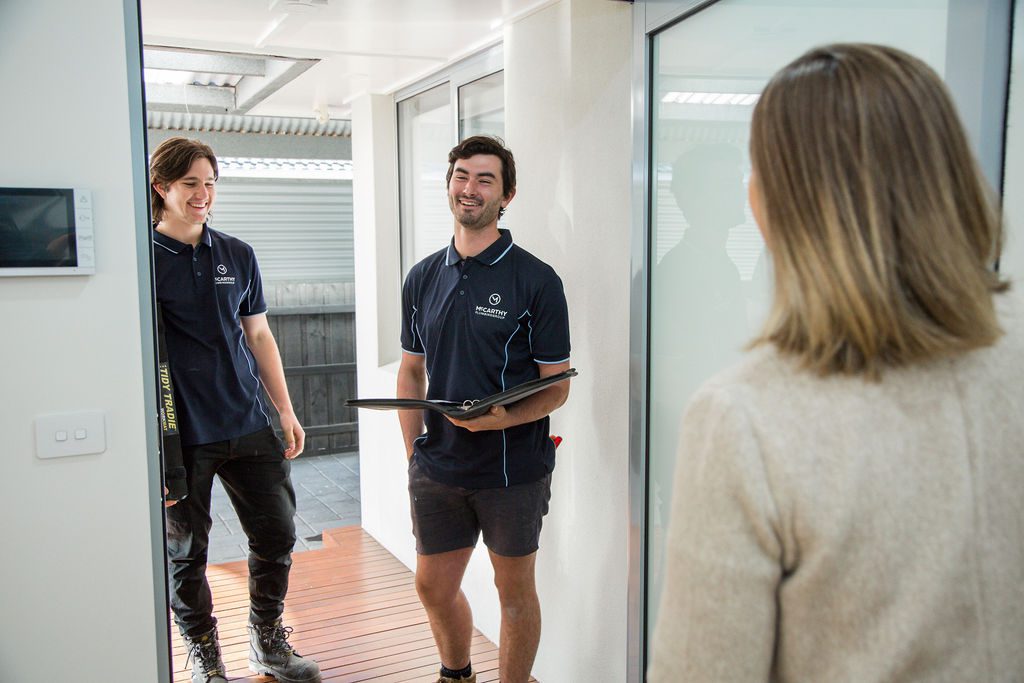In hot water…choosing the right hot water system
A faulty hot water system is pretty much the last thing we all want to spend our hard-earned income on, especially with a recession imminent, however none of us really enjoy having cold showers in the middle of winter either!
A hot water system will usually pick the most inappropriate time to stop working and can choose to torment you with either an annoying trickle or a startling burst. Signs your system may be nearing its end of days can include one or more of the following:
- The system is over 7 years old (Many Point Cook hot water systems in are now ageing)
- Your water isn’t getting as hot as it used to be
- There is a hissing noise coming from your tank
- Corrosion around the tank or fittings
- You have no hot water at all
The first thing our plumbers at McCarthy Plumbing Group will do to determine whether your hot water system needs replacing or simply repairing is ask the age of the system (Point Cook hot water systems are normally budget systems if installed with a volume build home). If the system is under 5 years old, and the problem is with the tank itself, the tank could be replaced under warranty. If the tank is over 5 years old and is out of warranty, a new hot water service will need to be installed (we can check your make and model for exact warranty details). If the problem is with one of the hot water service’s parts or fittings, you may get away with repairing and replacing with new parts (parts often only carry a 1-year warranty).
In our experience, Point Cook hot water system replacements are more common than Point Cook hot water system repairs if the unit is over 5 years old.
Now for the uncomfortable part, how much is it going to hurt your wallet? Well firstly, it’s always completely the client’s choice whether or not they choose to repair or replace their hot water service. A unit repair can cost up to approximately $500, and a replacement can cost up to approximately $2,500 for a continuous flow system. Repairing is obviously cheaper; however the client needs to weigh up if their system is over 5 years old, its over half its lifespan anyway, and repairing with parts may only get them another year or two before having to replace the entire hot water unit. It’s all about the risk they want to take, and obviously about their budget.
There are four different hot water system types in Australia. Gas, Solar, Heat Pump and electric hot water systems. These generally work in two different ways; water storage and ‘instantaneous’ or continuous flow systems.
Instantaneous hot water systems are perhaps wrongly termed; when you think about something that is ‘instant’ you expect it straight away. So when you turn the tap on in the shower in the bathroom situated furthest from the hot water unit and expect instant hot water you may blame your plumber for installing a faulty system. The fault however lies with the term ‘instantaneous’. There’s no such thing. Industry has now renamed the term to ‘continuous flow’ to give a more realistic title to rapid hot water.
The most common hot water repair and replacement work we do includes:
- Installing Rheem 135L natural gas hot water systems
- Installing Rheem 170L natural gas hot water systems
- Installing Aquamax 390 natural gas hot water systems
- Installing Rheem 50L electric hot water systems
- Installing Rheem 80L electric hot water systems
- Installing Rheem 125L electric hot water systems
- Installing Rheem 250L electric hot water systems
- Installing Rheem 300L electric hot water systems
- Installing Dux Sunpro hot water systems
- Installing Rheem heat pump hot water systems
- Installing Rinnai hot water systems
- Solar hot water unit bypass
- Frost Protection valve replacements
In most homes in West Melbourne that have solar hot water services, frost protection valves have been installed. If they don’t have these, we always suggest that frost protection valves be installed. Frost protection valves are designed to protect the hot water service’s solar panels by ensuring they don’t freeze when the outside air temperature drops. When the air temperature drops to between 3ᵒ and 4ᵒ, the thermostatic element opens in the valve and warm water is flushed through the solar storage tank in the panels which ensures the panels are less likely to freeze. A leaky frost protection valve in Point Cook or the surrounding suburbs is the most common plumbing problem we receive calls about on a cold winter’s day. More information on frost protection valves can be found here.
If you would like to discuss either repairing or replacing a hot water system that may be playing up, please call the McCarthy Plumbing Group team on 03 9931 0905.

